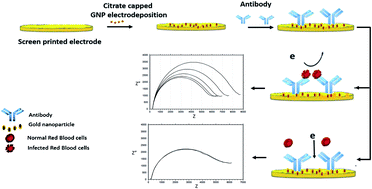Label-free electrochemical detection of malaria-infected red blood cells†
Abstract
The precise and rapid diagnosis of malaria is key to prevent indiscriminate use of antimalarial drugs and help in timely treatment and management of the disease. This paper reports a label-free detection of P. falciparum infected red blood cells using a gold nanoparticle (GNP) enhanced platform. The GNPs were electrodeposited on screen-printed electrodes to form a well-controlled matrix that served the dual role of antibody immobilization and signal enhancement. The detection of infected red blood cells was carried out by measuring changes in electrical parameters as a result of its binding to cell reactive antibodies immobilized on the electrode. The assay showed good sensitivity and a linear response between the electron transfer resistance and the logarithm of the number of infected red blood cells which was observed over a concentration range of 102 cells per mL to 108 cells per mL. This is the first report where an antibody-functionalized electrochemical biosensing platform has been employed for the quantitative detection of P. falciparum infected whole red blood cells.


 Please wait while we load your content...
Please wait while we load your content...